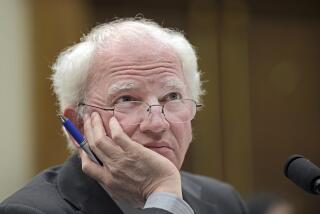Referee Urges the Disbarring of Defense Attorney DeMassa
- Share via
A California State Bar referee has recommended that well-known San Diego criminal defense attorney Phillip DeMassa be disbarred because in 1979 he harbored a fugitive connected with the infamous “Coronado Company” marijuana ring.
The recommendation, made by referee Gary Carlin on Feb. 3 and released publicly Tuesday, now goes to a review committee of the State Bar. If the committee concurs, it will be forwarded to the state Supreme Court, which traditionally upholds such recommendations.
Moral Turpitude Denied
DeMassa, 43, said he will ask for a new hearing because of his contention that he was not guilty of moral turpitude, the basis on which Carlin made his decision.
DeMassa pleaded guilty in November, 1985, to harboring Robert Kent Lahodney for a night in 1979, a week before Lahodney turned himself in to federal authorities. Lahodney subsequently pleaded guilty to marijuana smuggling, conspiracy to obstruct the government in collection of taxes, two counts of tax evasion, and engaging in a pattern of racketeering activity.
DeMassa himself was a central figure in the government’s investigation into the marijuana-smuggling ring, founded by young men who used surfboards to bring marijuana into the United States from Mexico and which grew in sophistication and scope.
DeMassa initially was charged by federal prosecutors with involvement in a drug conspiracy with members of the so-called Coronado Company, 60 of whom were ultimately convicted for various roles.
During that investigation, federal agents searched DeMassa’s office and home and retrieved more than 1,000 of his files. Later, however, an appeals court ruled the search illegal because it violated DeMassa’s clients’ rights to privacy.
But the U.S. attorney’s office in San Diego dropped its drug-related charges against DeMassa in exchange for his guilty pleas to three counts of illegal currency transactions and the one count of harboring a fugitive.
5-Year Probation
DeMassa was placed on five years’ probation and sentenced to six months in a community treatment center.
At the time of the plea bargain, DeMassa was barred from practicing in federal court, but it was reported at the time the crimes to which he confessed did not involve moral turpitude. Because of his guilty plea to a felony, the state Supreme Court ordered the State Bar to decide whether he should be allowed to practice in state court.
In his 21-page decision, Carlin, a neutral arbiter, concluded that DeMassa be disbarred because “the presumptively appropriate level of discipline for the final conviction of a crime which involves moral turpitude, either inherently or in the facts and circumstances surrounding the crime’s commission, is disbarment.”
Carlin said he could not argue for less severe punishment--such as a two-year suspension--despite DeMassa’s “lack of a prior record, his good faith, brilliance, dedication, personality and character, and his remorse, contrition and rehabilitation.”
On Tuesday, DeMassa maintained that he was not guilty of moral turpitude.
“Intellectually, it’s a wrong decision,” he said in an interview. “It didn’t take into consideration the realities of ethics.”
‘Ethically Proper’
He said harboring a fugitive “was an ethically proper act, since it aided the justice system. It (harboring a fugitive) is technically a violation of statute, but does that constitute moral turpitude? At some point, someone is going to have to address the ethical obligations of a lawyer when a fugitive comes to you.
“If you drive him down the street in your car and you turn right to the airport for the purposes of his fleeing, or if you turn left and take him home for the purposes of turning him in--either way, you are aiding him,” DeMassa argued.
During his defense before the confidential State Bar hearing, DeMassa said several witnesses--including lawyers and judges--testified that he acted appropriately by allowing Lahodney to stay at his house overnight because the outcome of his decision ultimately aided prosecutors.
Among those testifying on DeMassa’s behalf, according to Carlin’s decision paper, were Justice Thomas F. Crosby Jr. of the 4th District Court of Appeals, and federal Magistrate Edward Infante.
More to Read
Sign up for Essential California
The most important California stories and recommendations in your inbox every morning.
You may occasionally receive promotional content from the Los Angeles Times.













